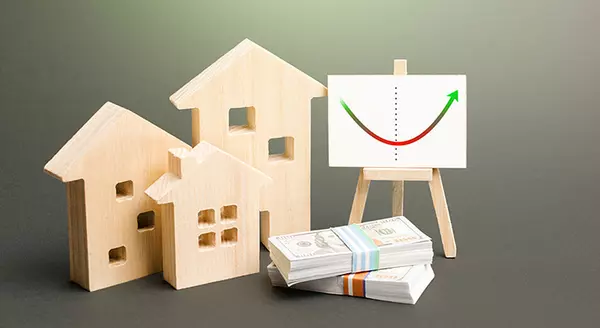
Home Prices Are Rebounding
If you’re following the news today, you may feel a bit unsure about what’s happening with home prices and fear whether or not the worst is yet to come. That’s because today’s headlines are painting an unnecessarily negative picture. If we take a year-over-year view, home prices did drop some, but that’s because we’re comparing to a ‘unicorn’ year when prices peaked well beyond the norm.To avoid an unfair comparison to that previous peak, we need to look at monthly data. And that tells a very different and much more positive story. While local home price trends still vary by market, here’s what the national data tells us.The graphs below use recent monthly reports from three sources to show the worst home price declines are already behind us, and prices are appreciating nationally. Looking at this monthly view, we can see the past year in the housing market can be divided into two parts. In the first half of 2022, home prices were going up, and fast. However, starting in July, prices began to go down (shown in red in the graphs above). By around August or September, the trend started to stabilize. But, looking at the most recent data for early 2023, these graphs also show that prices are going up again.The fact that all three reports show prices have been going up for three or more straight months is an encouraging sign for the housing market. The month-over-month data indicates a national shift is happening – home prices are rising again.Craig J. Lazzara, Managing Director at S&P Dow Jones Indices, says this about home price trends: “If I were trying to make a case that the decline in home prices that began in June 2022 had definitively ended in January 2023, April’s data would bolster my argument.” Experts believe one of the reasons prices didn’t crash like some expected is because there aren’t enough available homes for the number of people who want to buy them. Even with today’s mortgage rates, there are more people looking to buy than there are homes available for sale.Mark Fleming, Chief Economist at First American, explains how more demand than supply keeps upward pressure on prices:“History has shown that higher rates may take the steam out of rising prices, but it doesn’t cause them to collapse entirely. This is especially true in today’s housing market, where the demand for homes continues to outpace supply, keeping the pressure on house prices."Doug Duncan, Senior VP and Chief Economist at Fannie Mae, states home price growth is exceeding expectations thanks to that high demand:“. . . housing prices continue to show stronger growth than what was previously expected . . . Housing’s performance is a testimony to the strength of demographic-related demand . . .”Here’s How This Affects YouBuyers: If you've been holding off on buying because you were worried the value of your home would go down, knowing home prices have bounced back should bring you some relief. It also gives you the opportunity to own something that usually becomes more valuable as time goes on.Sellers: If you've been waiting to sell your house because you were concerned about how changing home prices would affect its value, it might be a good idea to team up with a real estate agent to list your house. You don't have to wait any longer because the latest data suggests things are turning in your favor.Bottom LineIf you delayed your moving plans because you were concerned about home prices dropping, the latest data reveals the worst is already over, and prices are appreciating nationally. Partner with a local real estate agent so you know what's happening with home prices in your area.
![Low Housing Inventory Is a Sweet Spot for Sellers [INFOGRAPHIC],KCM Crew](https://img.chime.me/image/fs/chimeblog/20230715/16/w600_original_eb6094cb-9580-48b0-84fc-070143ea47b5-png.webp)
Low Housing Inventory Is a Sweet Spot for Sellers [INFOGRAPHIC]
Some HighlightsToday’s housing inventory is still well below more normal years.This low inventory is why homes that are priced right are still selling quickly and seeing multiple offers.If you want to sell your house, now is a great time because inventory is still low. Contact a trusted real estate agent to start the process.

Renting or Selling Your House: What's the Best Move?
If you’re a homeowner ready to make a move, you may be thinking about using your current house as a short-term rental property instead of selling it. A short-term rental (STR) is typically offered as an alternative to a hotel, and they’re an investment that’s gained popularity in recent years.While a short-term rental can be a tempting idea, you may find the reality of being responsible for one difficult to take on. Here are some of the challenges you could face if you rent out your house instead of selling it.A Short-Term Rental Comes with ResponsibilitiesSuccessfully managing your house as a short-term rental takes a lot of time and effort. You’ll have to juggle tasks like dealing with reservations, organizing check-ins, and tackling cleaning, landscape, and maintenance duties. Any one of those can feel demanding, but all together it’s a lot to handle.Short-term rentals experience high turnover rates, as new guests check in and out frequently. This home traffic can lead to increased wear and tear on your property—meaning you may need to make more frequent repairs or replace your furniture, fixtures, and appliances more often. Think through your ability to make that level of commitment, especially if you plan to use a platform that advertises your rental listing. Most of them have specific requirements hosts must meet. An article from Bankrate explains:"Managing a rental property can be time-consuming and challenging. Are you handy and able to make some repairs yourself? If not, do you have a network of affordable contractors you can reach out to in a pinch? Consider whether you want to take on the added responsibility of being a landlord, which means screening tenants and fielding issues, among other responsibilities, or paying for a third party to take care of things instead."There’s a lot to consider before taking the leap and converting your house into a short-term rental. If you aren’t ready for the work it takes, it could be wise to sell instead.Short-Term Rental RegulationsAs the short-term rental industry continues to grow, regulations have increased. Legal restrictions commonly include limits on the number of vacation rentals in a particular location. This is especially true in larger cities and tourist destinations where there may be concerns about overcrowding or housing shortages for permanent residents. Restrictions may also apply to the type of property that can be used for short-term rentals.Many cities also require homeowners to obtain a license or permit before renting out their properties. Nick Del Pego, CEO at Deckard Technologies, explains:“Renting short-term rentals is considered a business by most local governments, and owners must comply with specific workplace regulations and business licensing rules established in their local communities.”It is important to thoroughly check whether short-term rentals are regulated or prohibited by the local government and your homeowners association (HOA) before even considering renting out your home. Bottom LineConverting your home into a short-term rental isn’t a decision you should make without doing your research. To decide if selling your house is a better alternative, talk with a local real estate agent today.
Categories
Recent Posts



![Housing Market Forecast for the Rest of 2023 [INFOGRAPHIC]](https://img.chime.me/image/fs/chimeblog/20230805/16/w600_original_c9462895-f33e-4df3-89f1-2e670cbd6573-png.webp)




![Key Housing Market Trends [INFOGRAPHIC]](https://img.chime.me/image/fs/chimeblog/20230729/16/w600_original_75d142d9-d96f-46e5-bff3-84d495a15913-png.webp)
